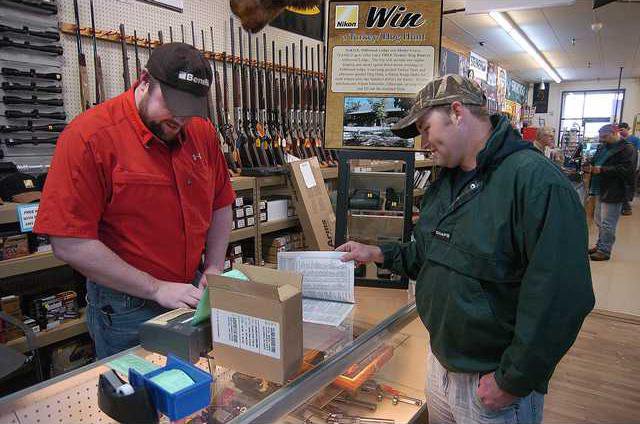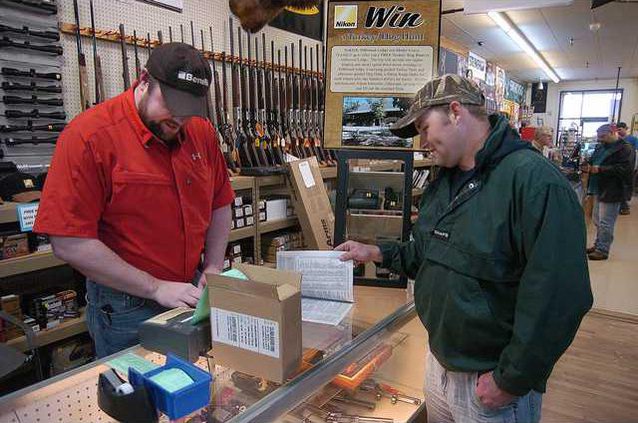0305DNRaud
Hear Todd Holbrook, assistant director of the Georgia Wildlife Resources Division, talk about the importance of keeping hunting and fishing licenses accessible to everyone.The Georgia Department of Natural Resources is getting out of the business of issuing hunting and fishing licenses and boat registrations. That job is being outsourced to a private, out-of-state company, and many people aren’t happy about it.
"I guess it’s in vogue to say we’re going to run government like a business and outsource everything," said Jerry McCollum, president of the Georgia Wildlife Federation. "But there are some things the government does pretty well, and issuing licenses is one of them."
The 50,000-member conservation group is protesting the DNR’s policy change, which McCollum said was made behind closed doors.
"There was no opportunity for public comment before they signed the contract," he said.
On Feb. 20, DNR officials announced they had chosen Missouri-based Central Bank to handle Georgia’s automated licensing system. By this fall,the company will offer license sales over the Internet, by phone or in person at certain selected retailers.
Central Bank will charge a "convenience fee" for each transaction. Hunting and fishing licenses would cost an extra $2.75 if purchased through the Internet, $4 by phone. Boating registrations would cost an additional $8 by Internet or $10 by phone.
That’s on top the current prices: $9 for fishing licenses; $10 for hunting licenses; and $15 for registering a small recreational boat.
Even with the new fees, licenses would still be affordable for almost everyone. But McCollum said that’s not the issue.
"It’s not about the money. It’s that these extra fees do not benefit the state," he said. "In the past, license increases were dedicated to retiring bonds that were used to buy land (for conservation). But with this, there’s no return to the sportsmen or to the wildlife management system."
Based on the number of licenses sold, the GWF estimates Central Bank will earn about $3.3 million annually from its contract with Georgia.
Robin Hill, spokeswoman for the DNR’s Wildlife Resources Division, said last year 1,039 Georgia vendors issued 1.7 million hunting and fishing licenses and 344,000 boat registrations.
But she said the DNR, which has struggling with funding cuts in recent years, no longer has the technology to cope with this volume.
"We have a decade-old computer system and the hardware for it is no longer even produced. It’s basically dead in the water," Hill said.
Rather than upgrade the DNR’s own system, state officials decided it would be cheaper and more efficient to hire a contractor. Todd Holbrook, assistant director of the Wildlife Resources Division, said Central Bank provides similar services to agencies in about 20 other states.
"This system is set up to encourage people to use the Internet," he said.
An advantage for consumers, Holbrook said, is that they would also be able to buy licenses by phone, which they haven’t been able to do since Bass Pro Shops stopped handling that service about a year ago.
"We feel having phone service is important, even though only about 2 percent of (license buyers) use it," he said.
But Holbrook acknowledged that the "overwhelming majority" of license sales have traditionally been walk-ins. Most people simply go to their neighborhood bait shop or sporting goods store, often stopping by as they’re heading out on a fishing trip.
Under the new system, they might not be able to do that anymore.
"Central Bank will be contracting with the top 20 percent of current license retailers in terms of sales volume," said Hill. "Currently, (license applications) are transmitted over a phone line rather than being a Web-based system. Under the new system, the vendor must have high-speed DSL (Internet service) and a printer."
That means some "mom-and-pop" bait shops may be left out in the cold, either because they don’t sell enough licenses or they don’t have a broadband connection.
McCollum believes if Central Bank only wants to do business with high-volume sellers, licenses will be available mostly at "big box" stores such as Wal-Mart, Kmart and Bass Pro.
Of course, if someone lives in a rural area with no large retailers nearby, they could always buy a license by phone or over the Internet. But McCollum expects there will be some resistance to this option.
"If you buy online or over the phone, you have to use a credit card. A lot of people still aren’t comfortable with that," he said.
Holbrook said he is worried about accessibility and wants to make sure that each county has at least one license vendor.
"We are concerned that the contractor is not going to use as many license agents as we’ve had in the past," he said. "We are currently looking at ways to ratchet up that number."
But Holbrook said dealing with hundreds of tiny stores is less efficient for the contractor and would increase the cost of issuing a license.
Jerry Clark, who runs the fishing department at Shuler’s Great Outdoors, a sporting goods store in downtown Gainesville, said small shops will take a financial hit if they are removed from the vendor list.
"We actually make very little just selling licenses," he said. "But when people come in to buy a license, they look around and buy other things."
Kerry Hicks, owner of the Smokin’ Fisherman near Clermont, said license sales are crucial for driving traffic into his store.
"While they’re here to get a license, they buy bait, they buy some rods and reels," he said.
Hicks said bait shops around Lake Lanier are already suffering because the low lake level has hurt business. He doesn’t know if they can withstand another blow.
And he’s angry about the DNR’s decision. "It doesn’t make a whole lot of sense to me," he said. "When people buy things in my store, that (tax) money stays in Hall County. But all the money (from license fees) will go to Missouri. It’s like Georgia is cutting its own throat."
Clark said he didn’t know about the DNR’s decision until Monday morning, when he read an article in Georgia Outdoor News magazine.
"This just kind of snuck up on us," he said.
Clark predicts many hunters and anglers still won’t be aware of the new rules when autumn rolls around.
"They’ll go into a bait shop and be told they can’t buy a license there anymore, and then they’ll get mad at the shop," he said.
Russ England, a retired DNR fisheries biologist who lives in Hall County, believes the situation should have been handled better.
"I think it’s a raw deal," he said. "It’s very poor management to do this without allowing any public input."
But Hill said once people get used to the new system, they’ll appreciate it.
"I think (consumers) don’t understand how easy it’s going to be," she said.

